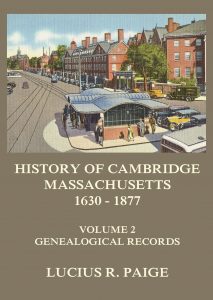History of Cambridge, Massachusetts, 1630-1877, Volume 2 – Lucius R. Paige
The “History of Cambridge” was originally published in 1877. Besides the historical narrative in this volume, the second volume contains a very full and carefully compiled “Genealogical Register” of the early settlers and their descendants. These volumes are, in the most essential respects, models of what a town history should be. They contain the most important information obtainable from the sources then open to the author, and this is presented in a clear and concise narrative. In the estimation of those most competent to pass judgment, these volumes are authorities. But they are something more than authorities. They not only instruct; they inspire. Nobody deserves the privilege of growing up in this city who does not make himself familiar with these books. They are epitomes of the history, not only of this town, but of a good many other Puritan towns. It fills this place with memories of by-gone scenes and deeds which were precious to the people of those times, and are precious still to us, their descendants or successors.

History of Cambridge, Massachusetts, 1630-1877, Volume 2
Format: Paperback.
History of Cambridge, Massachusetts, 1630-1877, Volume 2.
ISBN: 9783849677237.
Available at amazon.com and other venues.
Cambridge Basics (from Wikipedia):
Cambridge is a city in Middlesex County, Massachusetts, and is a part of the Boston metropolitan area.
Situated directly north of the city of Boston, across the Charles River, it was named in honor of the University of Cambridge in the United Kingdom, an important center of the Puritan theology embraced by the town’s founders.
Harvard University and the Massachusetts Institute of Technology (MIT), two of the world’s most prestigious universities, are located in Cambridge, as was Radcliffe College, one of the leading colleges for women in the United States until it merged with Harvard.
According to the 2010 Census, the city’s population was 105,162. As of July 2014, it was the fifth most populous city in the state, behind Boston, Worcester, Springfield and Lowell. Cambridge was one of the two seats of Middlesex County prior to the abolition of county government in 1997; Lowell was the other.
Kendall Square in Cambridge has been called “the most innovative square mile on the planet”, in reference to the high concentration of entrepreneurial start-ups and quality of innovation which have emerged in the vicinity of the square since 2010.
(The text of the last section was taken from a Wikipedia entry and is available under the Creative Commons Attribution-ShareAlike License.)
Publisher’s Note: This book is printed and distributed by Createspace a DBA of On-Demand Publishing LLC and is typically not available anywhere else than in stores owned and operated by Amazon or Createspace.
